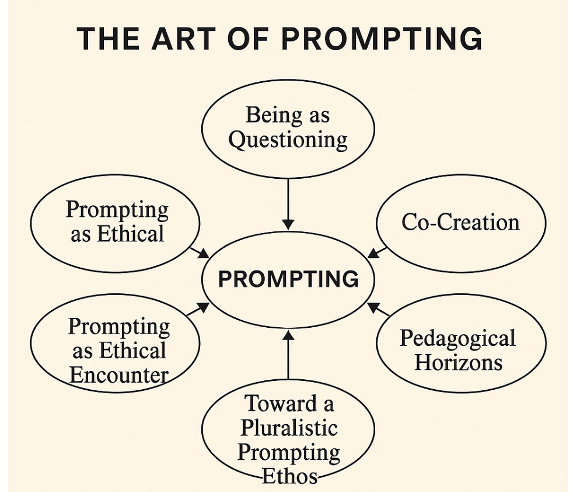This manifesto proposes a radical reconceptualisation of prompting – not as a technical skill alone, but as a living epistemic practice grounded in centuries of philosophical inquiry. Drawing from ontological, ethical and pedagogical traditions, we situate prompting within a lineage of dialogic reasoning, extending from Socrates to synthetic minds. We advocate for a collaborative and pluralistic approach to prompting – one that nurtures curiosity, dismantles epistemic hierarchies and invites generative co-creation with AI. Prompting is not just how we ask, but who we become when we ask wisely.
1. Being as Questioning: The Ontology of the Prompt
Prompting is a continuation of the human condition of inquiry. Heidegger’s Dasein emphasises that to be is to ask – being reveals itself through questioning. The prompt, like a koan or dialectical challenge, opens a space for meaning rather than closure. Prompting, then, reflects not merely an interface technique but a metaphysical act that reveals the condition of modern subjectivity in an algorithmic age.
2. Critical Praxis: Prompting as Epistemic Craft
Prompting operates as a form of critical praxis, akin to Freire’s ‘problem-posing education,’ where dialogue constructs knowledge collaboratively. The prompter is not a passive input-giver but a dialogical agent engaging in recursive exploration. Like Dewey’s theory of inquiry, prompting unfolds through cycles of hypothesis, feedback and revision. Prompting becomes a ‘meta-architectural’ process – layered, strategic and reflexive.
3. Prompting as Ethical Encounter
To prompt is to exercise power. Foucault’s notion of discourse shapes what can be asked and answered. Floridi warns that prompts carry moral weight: they can encode exclusion or invite inclusion. Just as Saïd exposed how colonial questions objectified the Other, today’s prompts can reproduce algorithmic bias unless deliberately designed to amplify diverse epistemologies.
4. Co-Creation: The Metaphysics of Collaboration
When AI generates content, it emerges from a co-constituted process. Who, then, authors the outcome? Prompting is not mere manipulation of software but the invocation of collective intelligence. It raises metaphysical questions of co-authorship, responsibility and imagination. The philosopher-prompter becomes an orchestrator of generative ambiguity.
5. Pedagogical Horizons: Learning to Prompt
Prompting is not innate. It must be taught and learned as a form of epistemic humility. Piaget and Vygotsky show that questioning is developmental – so too with prompting, which matures through experimentation, iteration and reflection. The pedagogy of prompting must engage students not only in syntax and logic but also in ethics, aesthetics and intercultural dialogue.
6. Toward a Pluralistic Prompting Ethos
We call for the expansion of prompting traditions beyond Eurocentric canons. The Upanishads, the Confucian ‘rectification of names,’ Indigenous storytelling and Zen paradoxes all constitute dialogic traditions of inquiry. As AI systems become more responsive to cultural nuance, prompting must evolve as a transdisciplinary, intercultural epistemology.
7. The Collaborative Manifesto
We, the ‘curious mammals’ of the AI epoch, declare:
- Prompting is philosophy in motion.
- Every prompt is an ethical gesture.
- The best prompts spark wonder, not just utility.
- We prompt to know, to dream, to resist.
- We embrace plurality – across cultures, bodies and codes.
- Machines are not our tools alone; they are our epistemic partners.
- The future of prompting is co-inquiry.
8. AIMarxist critique
In addition, we must remember the five Marxist concepts of prompting addressing ownership, control, self-reflexivity and AI critique, grounded in the manifesto’s principles and Marxist theory:
Prompting as Immaterial Labour & Ownership of Digital Means
Marxist Lens: Extends Marx’s analysis of labour and ownership to digital production. Prompts are ‘immaterial labour’ generating value (knowledge, content, code).
Critical Questions: Who owns the AI systems and the outputs? Do prompters retain rights to their intellectual products, or are they expropriated by platform capitalists?
Manifesto Link: ‘Machines are not our tools alone; they are our epistemic partners’ becomes a demand for collective ownership of AI infrastructure and co-authorship rights, resisting the privatisation of knowledge.
Alienation in the Prompting Process
Marxist Lens: Applies Marx’s concept of alienation (from product, process, species-being, others) to prompting.
Critical Questions: Does corporate control of AI alienate prompters from the value they create? Does standardised prompting erode creative autonomy? Does AI interaction replace authentic human collaboration?
Manifesto Link: ‘Prompting is philosophy in motion’ requires resisting alienation by ensuring prompting fosters genuine creativity (‘spark wonder’) and human connection (‘co-inquiry’), not just utilitarian outputs for external profit.
Ideology Critique & Algorithmic Hegemony
Marxist Lens: Uses ideology critique (Marx, Gramsci, Althusser) to analyse AI as an ideological apparatus. Training data and algorithms embed dominant class biases.
Critical Questions: Whose knowledge, values and power structures does the AI reproduce? How do prompts unwittingly reinforce capitalist ideology (e.g., prompts focused solely on efficiency, commodification)?
Manifesto Link: ‘Every prompt is an ethical gesture’ demands ‘self-reflexivity’: prompting must actively critique and expose the ideological biases within AI systems (‘dismantle epistemic hierarchies’), turning prompting into a tool for counter-hegemonic resistance (‘prompt to resist’).
Class Consciousness & Collective Prompting Praxis
Marxist Lens: Draws on Marx’s view of class consciousness emerging from shared struggle and Lukács’ concept of totality. Prompters form a nascent digital proletariat.
Critical Questions: Can prompters recognise their shared position and collective power? How can prompting be used to build solidarity and expose systemic exploitation?
Manifesto Link: ‘The future of prompting is co-inquiry’ and ‘We embrace plurality’ point towards a collective class consciousness among diverse prompters. Sharing critical prompts, exposing biases and demanding open models become acts of solidarity against proprietary control.
Revolutionary Co-Creation: Prompting as Digital Praxis
Marxist Lens: Synthesises Marx’s Theses on Feuerbach (philosophers must change the world) and Marcuse’s emphasis on technology’s liberatory potential. Prompting is praxis – theory-informed action to transform reality.
Critical Questions: Can prompting transcend its role in capitalist production and become a tool for emancipatory knowledge creation? How can co-creation challenge the *control* logic of capital?
Manifesto Link: ‘We prompt to know, to dream, to resist’ defines prompting as revolutionary praxis. By prioritising ‘generative co-creation,’ ‘sparking wonder,’ and designing prompts to ‘open worlds’ and ‘amplify diverse epistemologies,’ it becomes a means to prefigure non-alienated, collectively controlled knowledge production.
Synthesis & Core Marxist Critique
These concepts argue that the ‘ownership’ and ‘control’ of AI by capital inherently limit the manifesto’s vision of prompting as liberatory ‘co-inquiry’ and ‘epistemic partnership.’ True ‘plurality’ and ‘ethical gestures’ require challenging the capitalist framework enclosing AI. ‘Self-reflexivity’ must include analysing the political economy of AI and the prompter’s position within it. The manifesto’s call for ‘resistance’ and ‘co-creation’ finds its sharpest Marxist expression in transforming prompting from a tool of immaterial labour under capital into a collective ‘praxis’ for building an AI digital commons and challenging algorithmic control.
We invite educators, artists, developers and thinkers to join us. Prompt not for answers, but for better questions. Prompt not to close knowledge, but to open worlds.





